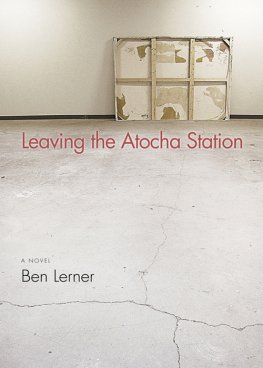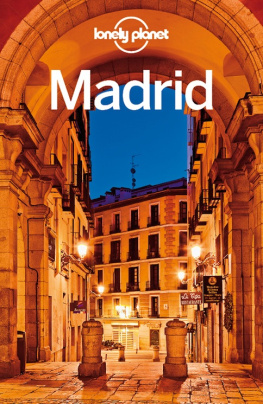Ben Lerner
Leaving the Atocha Station
Thank you: Ariana, Mom, Dad, Matt, Aaron, Brecht, C. D., Chris, Colin, Cyrus, Forrest, Geoffrey, Jacqueline, Jeff, Joanna, Jo-Lynne, Justin, Kyle, Skoog, Stephen, Tao, and Tom.
I have stolen language and ideas from Michael Clunes essay, Theory of Prose, which appeared in No: a journal of the arts, #7. Like Clune, I am indebted to Allen Grossmans essays in The Long Schoolroom. I first encountered the phrase lifes white machine in Jeff Clark and Geoffrey G. OBriens collaboration, 2A. John Ashbery used the phrase as an epigraph to the poem Longing of the Accords (Planisphere). An excerpt of this book was published as a pamphlet by Physiocrats Press. The novel includes, albeit in altered form, a reading of Ashberys poetry that first appeared in my essay The Future Continuous: Ashberys Lyric Mediacy, published by boundary 2. Leaving the Atocha Station is the title of a poem in Ashberys 1962 volume The Tennis Court Oath.
THE FIRST PHASE OF MY RESEARCH INVOLVED WAKING UP WEEKDAY mornings in a barely furnished attic apartment, the first apartment Id looked at after arriving in Madrid, or letting myself be woken by the noise from La Plaza Santa Ana, failing to assimilate that noise fully into my dream, then putting on the rusty stovetop espresso machine and rolling a spliff while I waited for the coffee. When the coffee was ready I would open the skylight, which was just big enough for me to crawl through if I stood on the bed, and drink my espresso and smoke on the roof overlooking the plaza where tourists congregated with their guidebooks on the metal tables and the accordion player plied his trade. In the distance: the palace and long lines of cloud. Next my project required dropping myself back through the skylight, shitting, taking a shower, my white pills, and getting dressed. Then Id find my bag, which contained a bilingual edition of Lorcas Collected Poems, my two notebooks, a pocket dictionary, John Ashberys Selected Poems, drugs, and leave for the Prado.
From my apartment I would walk down Calle de las Huertas, nodding to the street cleaners in their lime-green jumpsuits, cross El Paseo del Prado, enter the museum, which was only a couple of euros with my international student ID, and proceed directly to room 58, where I positioned myself in front of Roger Van der Weydens Descent from the Cross. I was usually standing before the painting within forty-five minutes of waking and so the hash and caffeine and sleep were still competing in my system as I faced the nearly life-sized figures and awaited equilibrium. Mary is forever falling to the ground in a faint; the blues of her robes are unsurpassed in Flemish painting. Her posture is almost an exact echo of Jesuss; Nicodemus and a helper hold his apparently weightless body in the air. C.1435; 220 262 cm. Oil on oak paneling.
A turning point in my project: I arrived one morning at the Van der Weyden to find someone had taken my place. He was standing exactly where I normally stood and for a moment I was startled, as if beholding myself beholding the painting, although he was thinner and darker than I. I waited for him to move on, but he didnt. I wondered if he had observed me in front of the Descent and if he was now standing before it in the hope of seeing whatever it was I must have seen. I was irritated and tried to find another canvas for my morning ritual, but was too accustomed to the paintings dimensions and blues to accept a substitute. I was about to abandon room 58 when the man broke suddenly into tears, convulsively catching his breath. Was he, I wondered, just facing the wall to hide his face as he dealt with whatever grief hed brought into the museum? Or was he having a profound experience of art?
I had long worried that I was incapable of having a profound experience of art and I had trouble believing that anyone had, at least anyone I knew. I was intensely suspicious of people who claimed a poem or painting or piece of music changed their life, especially since I had often known these people before and after their experience and could register no change. Although I claimed to be a poet, although my supposed talent as a writer had earned me my fellowship in Spain, I tended to find lines of poetry beautiful only when I encountered them quoted in prose, in the essays my professors had assigned in college, where the line breaks were replaced with slashes, so that what was communicated was less a particular poem than the echo of poetic possibility. Insofar as I was interested in the arts, I was interested in the disconnect between my experience of actual artworks and the claims made on their behalf; the closest Id come to having a profound experience of art was probably the experience of this distance, a profound experience of the absence of profundity.
Once the man calmed down, which took at least two minutes, he wiped his face and blew his nose with a handkerchief he then returned to his pocket. On entering room 57, which was empty except for a lanky and sleepy guard, the man walked immediately up to the small votive image of Christ attributed to San Leocadio: green tunic, red robes, expression of deep sorrow. I pretended to take in other paintings while looking sidelong at the man as he considered the little canvas. For a long minute he was quiet and then he again released a sob. This startled the guard into alertness and our eyes met, mine saying that this had happened in the other gallery, the guards communicating his struggle to determine whether the man was crazy perhaps the kind of man who would damage a painting, spit on it or tear it from the wall or scratch it with a key or if the man was having a profound experience of art. Out came the handkerchief and the man walked calmly into 56, stood before The Garden of Earthly Delights, considered it calmly, then totally lost his shit. Now there were three guards in the room the lanky guard from 57, the short woman who always guarded 56, and an older guard with improbably long silver hair who must have heard the most recent outburst from the hall. The one or two other museum-goers in 56 were deep in their audio tours and oblivious to the scene unfolding before the Bosch.
What is a museum guard to do, I thought to myself; what, really, is a museum guard? On the one hand you are a member of a security force charged with protecting priceless materials from the crazed or kids or the slow erosive force of camera flashes; on the other hand you are a dweller among supposed triumphs of the spirit and if your position has any prestige it derives precisely from the belief that such triumphs could legitimately move a man to tears. There was a certain pathos in the indecision of the guards, guards who spend much of their lives in front of timeless paintings but are only ever asked what time is it, when does the museum close, dnde esta el bao. I could not share the mans rapture, if thats what it was, but I found myself moved by the dilemma of the guards: should they ask the man to step into the hall and attempt to ascertain his mental state, no doubt ruining his profound experience, or should they risk letting this potential lunatic loose among the treasures of their culture, no doubt risking, among other things, their jobs? I found their mute performance of these tensions more moving than any Piet , Deposition, or Annunciation, and I felt like one of their company as we trailed the man from gallery to gallery. Maybe this man is an artist, I thought; what if he doesnt feel the transports he performs, what if the scenes he produces are intended to force the institution to face its contradiction in the person of these guards. I was thinking something like this as the man concluded another fit of weeping and headed calmly for the museums main exit. The guards disbanded with, it seemed to me, less relief than sadness, and I found myself following this man, this great artist, out of the museum and into the preternaturally bright day.














